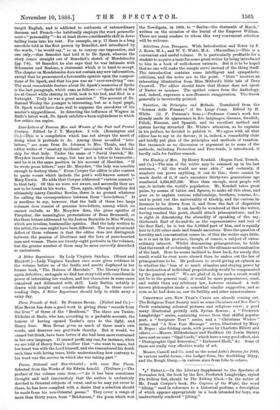The Kinship of Men. By Henry Kendall. (Kegan Paul, Trench,
and Co.)—The aim of the writer may be summed up in his last sentence, "All the world are near akin ;" and certainly, if numbers can prove anything, it can do this ; there cannot be much doubt of it, if one's ancestors thirty-two generations ago numbered 4,294,967,296. More than enough, most people will say, to include the world's population. Mr. Kendall takes great pains, by means of tables and figures, to make all this clear, and goes on to explain various relationships, brothers, cousins, &c., and to point out the universality of kinship, and the curious in- ferences to be drawn from it, and from the fact of dispersion and concentration. It can hardly be wondered at that the writer, having reached this point, should attack primogeniture; and he is right in denouncing the absurdity of speaking of the, say, thirteenth Earl of So-and-So as the representative and heir of the first Earl ; he is but the 8,192nd part of him, and is equally heir to 8,191 other male and female ancestors. Here the question of heredity and concentration comes in; of this the writer says little, as it is not in his province, though, of course, a subject of extra- ordinary interest. Whilst denouncing primogeniture, he holds that the result of co-heirship would be the ultimate nationalisation of the land. Here he seems inclined to draw back, for surely this result would be even more absurd than he makes out the law of primogeniture to be. He professes to avoid giving an opinion as to whether the "loss of so much stimulus and staying power by the destruction of individual proprietorship would be compensated by the general weal." We are glad of it, for such a result would not be to the general weal ; it would be more preposterous, cruel, and unfair than any arbitrary law, however strained. A well- known philosopher made a somewhat similar suggestion, and as soon as he had done so, saw its futility and utter unnaturalness.






































 Previous page
Previous page